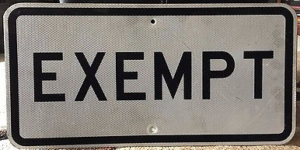
Updated 9/22/2017
Governor Abbott extended the state and local hotel occupancy tax exemption for guests affected by Hurricane Harvey through October 23rd. Note that FEMA is continuing to pay hotel occupancy taxes through the CLC system.
Governor Abbott temporarily suspended state and local hotel occupancy taxes for people affected by Hurricane Harvey and for documented relief workers.
Both the statewide six (6) percent state hotel occupancy tax and all other local hotel occupancy taxes shall not be charged to guests who are the staying in hotels because of Hurricane Harvey or personnel participating in relief operations.
This suspension is effective beginning August 23, 2017, and ending October 23, 2017. Hotels should begin collecting taxes from affected guests starting on October 24, 2017.
If the guest is exempt under the Hurricane Harvey tax exemption, the taxes for staying the night beginning on October 23rd and ending on the morning of October 24th will be exempted under the proclamation.
Documentation procedure:
Hotels should ask each hotel guest at check-in or at check-out if they are a guest staying at the hotel because the guest is affected by Hurricane Harvey, or if the guest is a relief worker.
If the guest is staying at the hotel because the guest was affected by the storm, or if the guest is a documented relief worker, the hotel should provide the guest a hotel tax exemption certificate to fill out. The hotel should not apply local or state hotel occupancy taxes to that guest’s room night charges for the declared hotel tax exemption period.
[Note: The hotel itself need not be located in a disaster-affected county for the tax exemption to apply.]
On the hotel tax exemption certificate form, the guest should:
- At the top of the form where it asks for the “Name of the exempt entity,” the guest should write in their personal name.
- At the bottom of the form, the guest should check the box for “Exempt by Other Federal or State Law and write in: “Hurricane Harvey.” If the guest is a relief worker, they should instead indicate “Relief Worker” and include a signed statement from their agency indicating that they were dispatched due to the relief effort.
Hotels will also later document the provision of these exemptions in the hotel’s monthly or quarterly hotel tax remittance to the local and state government.
If the hotel’s electronic billing system does not allow suspension of the hotel tax charges, a refund of the state and local hotel tax charges should be provided to the guest upon checkout.
As noted above, each guest who is given this exemption from hotel tax should be asked to complete the standard hotel tax exemption certificate which most hotels have on-site or can access the certificate here.
Hotel occupancy tax exemptions on third-party travel company reservations
Guests entitled to a refund or exemption of state and local hotel taxes for transactions conducted through a third-party online travel company should first contact the online travel company directly. This is consistent with the Texas Comptroller’s advice found in their Frequently Asked Questions section of their website found here.
For refunds of hotel occupancy taxes, we recommend that hotels first direct all qualifying guests to the third-party travel company through which the guest made (and paid for) their reservation(s).
In certain cases where the hotel has already billed the online travel company’s virtual card for both the guest’s lodging and the occupancy taxes, the hotel may need to coordinate with the online travel company to either have the hotel reimburse the tax to the guest, or have the hotel refund the tax to the online travel company so the online travel company can refund the guest.
In these scenarios, we suggest communicating with the online travel company via the online travel company’s partner communications channel. Taxes will only be refunded for actual taxes paid.


One comment on “Suspension of State and Local Hotel Occupancy Taxes”